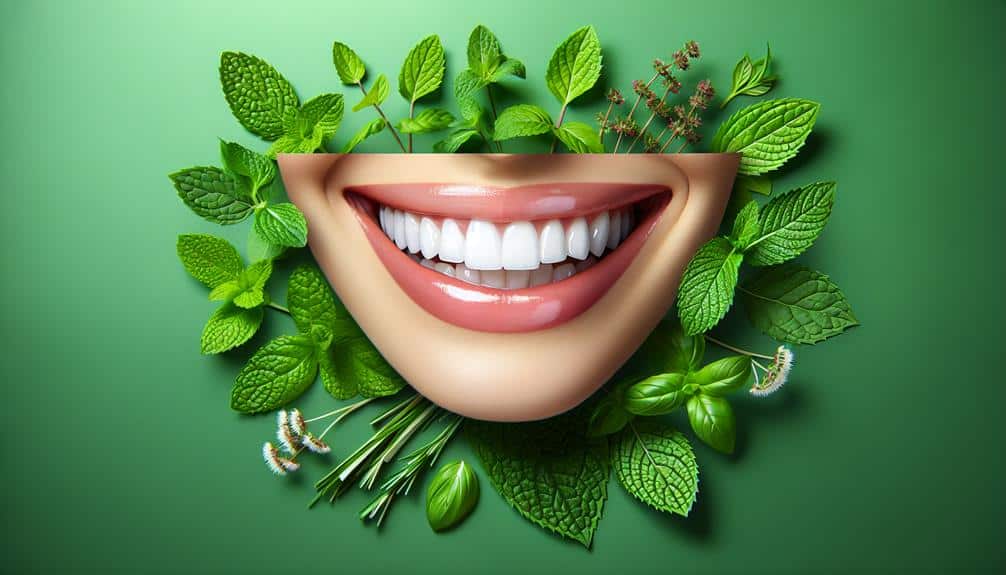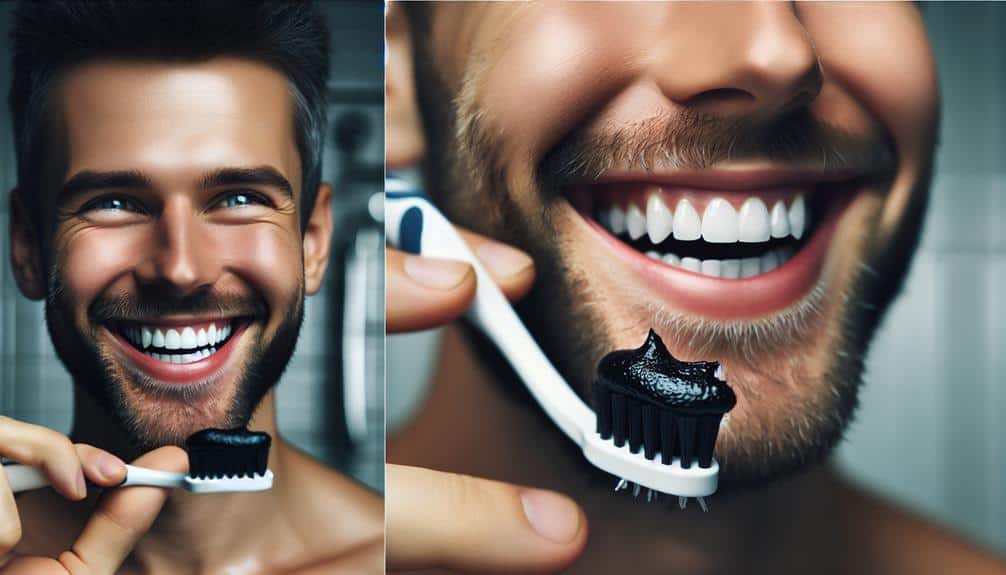Looking to eliminate coffee stains on your teeth? Whitening toothpaste with hydrogen peroxide, baking soda, activated charcoal, coconut oil, and fluoride are effective solutions. These ingredients work to break down and scrub away surface stains from coffee and other pigmented foods, leading to a whiter smile over time. Consider these clinically proven options over natural alternatives for visible results.
Key Points
- Look for whitening toothpaste with hydrogen peroxide for effective coffee stain removal.
- Choose a toothpaste containing baking soda to gently scrub away surface coffee stains.
- Opt for toothpaste with fluoride to aid in removing stains and strengthen teeth.
- Maintain a consistent brushing routine, covering all tooth surfaces for optimal whitening.
- Regular dental check-ups, flossing, and mouthwash usage are essential for a bright smile.
Benefits of Whitening Toothpaste
When choosing a whitening toothpaste, selecting one with clinically proven ingredients can effectively help reduce coffee stains on your teeth. While natural alternatives like baking soda or activated charcoal may have some mild whitening effects, they lack the scientific backing that professional treatments offer.
Whitening toothpaste typically contains abrasives or chemicals that work to remove surface stains caused by coffee, tea, or other pigmented foods. These ingredients can help break down the molecules responsible for discoloration, resulting in a brighter smile over time.
Compared to professional treatments like in-office whitening or at-home bleaching kits prescribed by dentists, whitening toothpaste is a more affordable and convenient option for maintaining a brighter smile. While professional treatments may provide quicker and more dramatic results, whitening toothpaste can be a practical choice for daily use to help combat the effects of coffee stains and prevent new discoloration from forming.
Key Ingredients to Look For
To effectively combat coffee stains on your teeth, look for whitening toothpaste that contains key ingredients known for their stain-fighting properties. When selecting a toothpaste to target coffee stains, keep an eye out for ingredients like hydrogen peroxide, baking soda, and activated charcoal. These components are renowned for their ability to break down and remove stains effectively. Hydrogen peroxide acts as a bleaching agent, helping to lighten stains on the teeth. Baking soda, with its mild abrasive properties, aids in scrubbing away surface stains caused by coffee consumption. Activated charcoal, known for its absorbent qualities, can bind to stains and toxins on the teeth, assisting in their removal.
If you prefer natural alternatives or DIY remedies, ingredients such as coconut oil, apple cider vinegar, and turmeric are worth exploring. Coconut oil pulling can help reduce bacteria in the mouth and potentially lift surface stains. Apple cider vinegar, although acidic, can be used sparingly to remove stains, while turmeric's natural anti-inflammatory properties may assist in maintaining oral health. Remember to use these ingredients cautiously and consult with a dental professional if you have any concerns.
Best Whitening Toothpaste for Coffee Stains
For effectively targeting coffee stains on your teeth, consider incorporating a whitening toothpaste with key stain-fighting ingredients. When looking for the best whitening toothpaste to tackle coffee stains, opt for products that contain the following:
- Hydrogen Peroxide: This ingredient is effective in breaking down stains on the surface of your teeth, helping to reveal a whiter and brighter smile.
- Baking Soda: Known for its gentle abrasive properties, baking soda can help scrub away stubborn coffee stains without causing damage to your enamel.
- Fluoride: While primarily known for its cavity-fighting abilities, fluoride can also aid in removing surface stains and strengthening your teeth.
How to Use Whitening Toothpaste Effectively
For optimal results with whitening toothpaste, maintain a thorough and consistent brushing routine to effectively address coffee stains on your teeth. When using whitening toothpaste, pay attention to your brushing techniques. Guarantee you cover all tooth surfaces, including the front, back, and chewing surfaces. Use gentle circular motions and make sure to brush for at least two minutes to allow the whitening ingredients to work effectively.
The time of day you brush your teeth can also impact the effectiveness of whitening toothpaste. It's advisable to brush your teeth twice a day, once in the morning and once before bed. Brushing in the morning helps remove plaque and stains that have accumulated overnight, while brushing at night prevents bacteria buildup. Consistency is vital, so stick to your routine for the best results.
Tips for Maintaining a Bright Smile
Maintaining a bright smile involves more than just using whitening toothpaste; it requires consistent oral hygiene habits and lifestyle choices that promote dental health. To keep your smile radiant, consider the following tips:
- Regular Dental Check-ups: Visiting your dentist for routine check-ups and cleanings can help prevent dental issues and make sure your smile stays bright.
- Proper Flossing Techniques: Flossing daily helps remove plaque and food particles between teeth that brushing alone may miss, promoting healthier gums and a brighter smile.
- Utilize Mouthwash Benefits: Incorporating a mouthwash into your oral care routine can help reduce plaque, fight bad breath, and promote overall oral health, contributing to a more luminous smile.
Frequently Asked Questions
Can Using Whitening Toothpaste to Remove Coffee Stains on Teeth Lead to Increased Tooth Sensitivity?
To prevent sensitivity concerns when using whitening toothpaste for coffee stain removal, choose a formula designed for sensitive teeth. Look for ingredients like potassium nitrate or arginine to maintain oral health while addressing discoloration effectively.
Are There Any Potential Side Effects of Using Whitening Toothpaste to Remove Coffee Stains on Teeth?
Using whitening toothpaste for coffee stains may lead to potential risks like increased sensitivity. Consider alternatives like natural remedies. Long term effects may vary based on ingredients. Be cautious with prolonged use.
How Long Does It Typically Take to See Noticeable Results When Using Whitening Toothpaste for Coffee Stains?
For most individuals, whitening toothpaste can show noticeable results in about 2-6 weeks with twice daily use. Consistent application frequency is key. To maintain results, follow a good oral hygiene routine to prevent future stains and understand long-term effects.
Can Whitening Toothpaste Be Used as a Substitute for Professional Teeth Whitening Treatments for Coffee Stains?
For coffee stains, whitening toothpaste offers a convenient DIY option, yet it may not fully substitute professional whitening treatments. Natural remedies like baking soda are gentler alternatives. Professional treatments provide more intense and lasting results.
Are There Any Specific Dietary or Lifestyle Changes That Can Help Enhance the Effectiveness of Whitening Toothpaste for Coffee Stains on Teeth?
To enhance whitening toothpaste's effectiveness on coffee stains, focus on dietary changes like reducing coffee intake and consuming stain-fighting foods. Lifestyle adjustments, such as quitting smoking and regular dental cleanings, can also boost results drastically.



